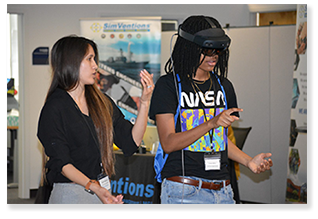Multi-Material, Approached Guided, Controlled-Resolution Breast Meshing for FE-Based Interactive Surgery Simulation
Faculty Advisor/Mentor
Michel Audette
Location
Virginia Modeling, Analysis and Simulation Center, Room 2100
Conference Title
Modeling, Simulation and Visualization Student Capstone Conference 2023
Conference Track
Medical Simulation
Document Type
Paper
Abstract
This paper proposes a guided, controlled resolution framework for 3D multi-material meshing. Using data from magnetic resonance (MR) images, we efficiently focused on demonstrating our framework for patient-specific breast cases. As a result, we can preserve the shared boundaries and enhance the resolution without negating the aspect of simulation computing time needed for finite element analysis (FEA). Our output is a high-quality volumetric mesh comprising 21K cells representing the three main parts for breast surgery simulation and planning, fat, fibroglandular (FGT), and tumor mass. Our approach combines three steps, surface meshing, surface mesh decimation, and generating a volumetric mesh. We showed experimental results for every stage and compared our final output to other literature, proving our method's efficiency in an accurate, simple, and high-quality presentation of a patient-specific breast meshing.
Keywords:
Multi-material breast mesh, Shared boundaries, Simulation, Breast surgery, Surgery planning
Start Date
4-20-2023
End Date
4-20-2023
Recommended Citation
Alqaoud, Motaz; Feliberti, Eric; Fichtinger, Gabor; Rashid, Tanweer; Plemmons, John; Kaipa, Krishnanand; Xiao, Yimming; and Audette, Michel, "Multi-Material, Approached Guided, Controlled-Resolution Breast Meshing for FE-Based Interactive Surgery Simulation" (2023). Modeling, Simulation and Visualization Student Capstone Conference. 3.
https://digitalcommons.odu.edu/msvcapstone/2023/medicalsimulation/3
Multi-Material, Approached Guided, Controlled-Resolution Breast Meshing for FE-Based Interactive Surgery Simulation
Virginia Modeling, Analysis and Simulation Center, Room 2100
This paper proposes a guided, controlled resolution framework for 3D multi-material meshing. Using data from magnetic resonance (MR) images, we efficiently focused on demonstrating our framework for patient-specific breast cases. As a result, we can preserve the shared boundaries and enhance the resolution without negating the aspect of simulation computing time needed for finite element analysis (FEA). Our output is a high-quality volumetric mesh comprising 21K cells representing the three main parts for breast surgery simulation and planning, fat, fibroglandular (FGT), and tumor mass. Our approach combines three steps, surface meshing, surface mesh decimation, and generating a volumetric mesh. We showed experimental results for every stage and compared our final output to other literature, proving our method's efficiency in an accurate, simple, and high-quality presentation of a patient-specific breast meshing.


